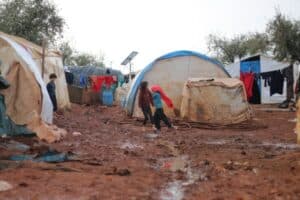This page contains affiliate links. This means if you a follow a link and make a purchase, at no additional cost to you, Humanitarian Careers will receive a commission. Thank you for supporting the site.
Joining a graduate scheme can be a great way to begin a career in humanitarian aid. Many top humanitarian organisations run traineeships for recent graduates that aim to build on their education and provide them with the practical skills and experiences needed for front-line aid work.
We’ve put together a list of some of the top humanitarian NGO’s offering graduate training schemes.
Save the Children: Humanitarian Trainee Scheme
Save the Children UK offers one of the top graduate schemes in the humanitarian sector. The year-long traineeship is aimed at recent graduates wanting to begin a career in humanitarian aid. The scheme combines formal training, on-the-job learning, work placements and mentoring and aims to equip recent graduates with the skills and experience needed to build careers within the aid industry.
The Save the Children Humanitarian Trainee Scheme is aimed at recent graduates or those with less than two years’ experience working with NGOs. The graduate scheme is divided into two parts with trainees first spending six months within the HQ of an international NGO or government department responsible for humanitarian programming. This is followed by six months of field work on the front-line of a humanitarian response.
The Humanitarian Trainee Scheme is ran by Save the Children in the UK, Jordan, Bangladesh and Kenya. Applicants must have the right to work in the country in which they will attend the HQ part of the traineeship.
The Save the Children graduate trainee scheme is not paid. Trainees deployed abroad for the response part of the graduate scheme will be supported in their visa applications, as well as provided housing, accommodation and a stipend.
Islamic Relief: Internship Programme
Islamic Relief have a graduate internship programme for those wanting to begin a career in humanitarian aid. The internship programme aims to train the next generation of humanitarians.
As a faith-based NGO, Islamic Relief puts a significant enthesis on the religious aspects of humanitarian work and this is reflected in their graduate internship scheme.
Graduates who join the Islamic Relief humanitarian internship programme cover a wide range of work functions. With a combination of assignments, practical trainings and on-the-job learning, the Islamic Relief graduate scheme provides a breadth of skills and knowledge that will equip trainees for a future career in humanitarian aid.
The three-month graduate internship programme at Islamic Relief is unpaid.
Applicants to the Islamic Relief graduate internship programme must have completed an honours degree in the last two years. They also must demonstrate a passion for humanitarian work, be highly motivated, dynamic and have excellent inter-personal skills. Strong written skills and attention to detail are also requested.
Islamic Relief requires graduates on their internship scheme to be dedicated to their faith-based humanitarian values.
Hong Kong Red Cross: Humanitarian Trainee Scheme
The Hong Kong Red Cross has a humanitarian trainee scheme for recent graduates. The trainee scheme aims to introduce graduates to a wide range of experiences within the humanitarian sector and assist them to develop a professional career in aid.
With a focus on both personal and professional growth, the Hong Kong Red Cross Humanitarian Trainee Scheme is one of the leading humanitarian graduate programmes in Asia.
As a six-month paid graduate programme, the Hong Kong Red Cross trainee scheme is ideal for those wanting to begin a career in humanitarian aid. The programme moves graduates through different services within the Hong Kong Red Cross allowing for a wide range of knowledge to be developed across many types of humanitarian work. The graduate scheme combines orientations, on-the-job training and a ‘buddy’ support system.
Aside from being a recent graduate with an interest in humanitarian work, the trainee scheme at the Hong Kong Red Cross does not have many formal requirements. They state they look for applicants with project management and coordination knowledge, creative thinking, good communication and presentation skills, as well as copywriting and analytical skills.
Humanitarian Aid Online Courses
If you are looking to work in humanitarian aid, we highly recommend the online course International Humanitarian and Development Careers. We think it provides one of the best overviews of the humanitarian sector and gives valuable insights for those searching for jobs in humanitarian aid. Follow the link to the course’s page for more information.
The International Humanitarian Law Theory and Practice online course offered by Leiden University in the Netherlands provides a fantastic theoretical overview of humanitarianism. We think it’s one of the top online courses for those who want to understand the basics of international humanitarian law. Click the link to visit the course’s page for more information.
We also think the Humanitarian Action Response and Relief online course offered by Coventry University is a must for anyone looking to become a humanitarian aid worker. It only takes around three weeks to complete and would be a major addition to the CV of anyone looking to work in the aid sector. The link is to the course’s page.
United Nations: Junior Professional Officer Programme
One of the main United Nations graduate training schemes is known as the Junior Professional Officer (JPO) programme. The aim of the JPO programme is to give recent graduates the opportunity to gain hands-on field experience within the United Nations.
Graduates in JPO positions contribute to many different areas of the UN, including humanitarian operations. Becoming a JPO is one of the best ways to start a career in the UN and humanitarian aid.
Recent graduates looking for a career in humanitarian work within the United Nations should apply for the JPO programme. JPO’s gain valuable professional experience within the United Nations and are often well placed to apply for future ‘P – Professional’ level jobs across the UN.
Application requirements for JPO positions in the UN differ depending on the donor country of the role. However, most UN JPO jobs require applicants to have a post-graduate degree and be under a certain age (usually early 30s). Some JPO jobs require graduates to have a few years of professional experience.
Oxfam GB: Trainee Scheme
Oxfam GB has a humanitarian trainee scheme open to recent graduates. The scheme aims to take people from a wide range of backgrounds and provide them with the skills and experiences needed to build a career in the humanitarian aid sector. Trainees rotate between different departments and projects within Oxfam allowing them to gain a wide range of experiences across all parts of a large humanitarian NGO.
The 11-months Oxfam trainee scheme is paid.
Whist with Oxfam, trainees can expect to learn important skills in the humanitarian sector such as project management, grant and report writing, communication and research as well as specifically about Oxfam’s programming. The scheme encourages trainees to share their insights and ideas and be an active member of Oxfam GB.
Oxfam stresses that their trainee scheme is a not a graduate scheme, although it is open to recent graduates. A degree is not a formal requirement and Oxfam hopes to recruit people from many parts of society to the traineeship. The main attributes they seek are enthusiasm and dedication to Oxfam’s poverty reduction work and the fight against inequality.
World Vision: Internships
The US branch of World Vision has a wide range of internships open to graduates. As one of the largest Christian humanitarian agencies, these graduate internships are ideal for those wanting to begin their career in the aid sector with a faith-based NGO.
World Vision US internships are three months and can be based in New Work, LA, Seattle or Washington DC. There are also graduate internship opportunities at other World Vision offices.
Internships at World Vision are aimed at introducing graduates to the humanitarian sector whilst allowing them to develop knowledge and understanding that can help them pursue a career in aid. Graduate interns take on ‘challenging and meaningful’ projects whilst building technical skills and getting hands-on experience in aid work.
World Vision encourages interns on their graduate programme to connect and network together.
World Vision recruits graduates individually for their for internships. Open internships and specific requirements can be found on their website.
Samaritan’s Purse: Global Internship Programme
Samaritan’s Purse is a large American Christian NGO. They have a graduate scheme that provides internships at both HQ and field offices. Interns on the Samaritan’s Purse scheme gain valuable insights into humanitarian work whilst being able to make a tangible impact on Samaritan’s Purse projects.
The Samaritan’s Purse Global Internship Programme is ideal for recent graduates who want to start their humanitarian career with a faith-based organisation.
The Samaritan’s Purse internship scheme allows trainees to build knowledge across a number of key functions of a large humanitarian NGO. This breadth of knowledge helps Samaritan’s Purse interns to have the skills and experiences needed to further build their career within the humanitarian sector. The Samaritans Purse graduate scheme also has a particular focus on Christian faith and its relation to humanitarian work.
The Samaritan’s Purse Global Internship Programme is paid with trainees receiving a monthly stipend and the opportunity to live for free with a host family. The internships can be done in the US or abroad.
For international interns, Samaritan’s purse offers flights, visas, accommodation and housing. Graduates can apply to the Samaritan’s Purse internship scheme from any field of study with an enthesis placed on individual talent.
American Red Cross: LEAD Rotational Programme
The American Red Cross has one of the best humanitarian graduate schemes in the US. Their Leadership Education and Development (LEAD) Rotational programme is a three-year graduate scheme that propels trainees into front-line field positions within the American Red Cross.
As one of the most comprehensive graduate schemes in the humanitarian sector, the American Red Cross LEAD Rotational programme is ideal for beginning a career in aid work.
Throughout the LEAD Rotational graduate programme at the American Red Cross, trainees move through key functions within the organisation. The scheme aims for trainees to build wide ranging operational skills and whilst developing the knowledge and experiences needed to be leaders in the aid sector.
The American Red Cross humanitarian graduate scheme also includes mentorships with senior executives.
The American Red Cross LEAD Rotational Programme is a paid graduate scheme. Ideal applicants should have 3-5 years of work experience before graduate school and hold (or be pursuing) an MPA, MBA, MA or MPP master’s level degree. Desired applicant qualities include strong communication and management skills, as well as the ability or navigate complex organisations. The graduate scheme includes work at American Red Cross offices around the world so trainees must be willing to relocate as needed.
International Committee of the Red Cross: Graduate Associates
The International Committee of the Red Cross runs an Associates programme for recent graduates. IRCR has over 80 places a year for graduates who want to gain experience in the humanitarian aid sector. Trainees on the ICRC graduate scheme get support and supervision from a range of teams with a focus on building the competencies needed for humanitarian field work.
The ICRC humanitarian graduate scheme is 12 months. Trainees can join departments such as international policy and law, communications and information management, operations, finances and logistics, and HR.
Trainees on the ICRC graduate scheme are encouraged to contribute directly to the organisations work through writing, research evaluation and analysis.
The requirements for the ICRC humanitarian graduate scheme include having recently completed a degree and with less than one year of professional work experience. Two years within a previous trainee scheme is also acceptable.
The IRCR graduate scheme is paid. The scheme also includes an informal ‘buddy’ scheme as well as extensive formal training opportunities.
Catholic Relief Services: International Development Fellows Program
Catholic Relief Services (CRS) is the main humanitarian organisation of the Catholic church. They have a graduate training scheme known as the International Development Fellows Program. The scheme is aimed at those wanting to following a career in humanitarian relief and development work. A particular focus is placed on developing the skills needed for aid work and gaining valuable practical field experience.
Graduates on the CRS International Development Fellows Program work next to experienced CRS staff on critical work within the organisation.
The CRS graduate scheme allows trainees to gain experience in four core areas of humanitarian work – project management, project design, systems and operations and partnerships. CRS states that upon completion of the graduate scheme trainees are seen as competitive for a wide range of jobs within Catholic Relief Services.
The Catholic Relief Services graduate training scheme is 12 months. Requirements for the International Development Fellows Program at CRS include the completion of a graduate degree in a relevant field, six months’ work or volunteer experience in the developing country, fluency in English and strong communication skills, high-standard in a second language (ideally French, Arabic or Portuguese) and willingness to work in sometimes difficult conditions abroad.
Mercy Corps: Internships
Mercy Corps has a range of internships open to recent graduates who want to begin a career in humanitarian aid. Mercy Corps takes a specific community lead approach to their humanitarian programming and seeks interns who are interested in this model of humanitarian action.
Mercy Corps recruits individually for their graduate internships and this allows trainees to undertake training in the specific area of humanitarian aid that interests them.
Graduate internships at Mercy Corps can be done at their HQ offices in the US or Europe or at their field offices. HQ internships allow graduates to conduct real-time research into the humanitarian sector whilst gaining valuable coordination experience in humanitarian aid and development. Field internships with Mercy Corps are ideal for graduates that want first-hand frontline experience in humanitarian aid delivery.
All graduate internships at Mercy Corps can be browsed on their websites. Listings include the requirements per internship.

Norwegian Refugee Council: Talent Development Programme
The Norwegian Refugee Council is one of the largest humanitarian organisations in the world. Their Talent Development Programme aims to bring new graduates into the humanitarian sector.
The NRC Talent Development Programme is specifically linked to the programmatic needs of the organisation, allocating trainees to core functions across their humanitarian work.
Graduates on the NRC Talent Development Programme develop extensive knowledge and skills within the humanitarian sector by taking on vital work within the NGO. The Talent Development Programme at NRC aims to provide supportive leadership and individual training to recent graduates to allow them to effectively support NRC’s humanitarian responses.
The NRC Talent Development Programme lasts around 8 months. Full details should be sought from NRC directly.
United Nations: Young Professional Programme
The United Nations Young Professionals Programme (YPP) aims to recruit talented graduates to begin careers within the UN. The YPP recruits incoming graduates to fill gaps needed within the United Nations and trains new UN staff to be international civil servants to UN standards. The UN YPP is one of the best graduate schemes for launching a career in humanitarian aid.
Graduates who join the UN YPP are offered a two-year fix-term contract at either P-1 or P-2 level within the UN Secretariat. After graduates on the YPP have completed their two-year fixed-term contract they may be offered an extension or another position within the UN’s programmes – including many frontline humanitarian operations.
To join the YPP graduates need to complete an entry exam. The UN YPP entrance exam is held once a year. Full details can be found on the UN’s YPP web-portal.
If you want to learn more about how to become a humanitarian worker, explore our list of the top humanitarian aid online courses here.






